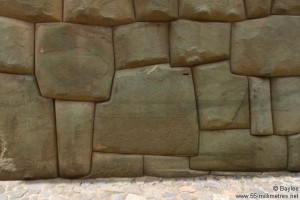Incas
The Incas or at least their ancestors are claimed by Jim Allen to have ruled Atlantis, which he insists exited on the Altiplano of the Andes in Bolivia. However, the idea of a connection between Atlantis and the cultures of Central and South America is not new, having been first mooted by Pedro Samiento de Gamboa in 16th century. Supporters of the theory today cite the extremely controversial Oera Linda Book which states that one of the Frisian naval commanders named Inka reached America after the destruction of Atlantis. With this tenuous etymological link they conclude that he was the founder of the Inca civilisation, ignoring the fact that the earliest evidence for the Inca tribe dates to around 1200AD while the Oera Linda Book puts the destruction of Atlantis circa 2200BC, leaving an unexplained gap of nearly 3500 years. A Frisian–Inca connection is also proposed on the Stepping Stones website(a) which for good measure endeavours to link them with the Shang Chinese, the Magyars and, of course, the Atlanteans(b).
The great tragedy of the Inca culture is that they left no written records with the exception of the knotted strings known as quipu (khipu)(d). Gary Urton is a Professor of pre-Columbian Studies and has a website dedicated to the study of quipu(e). In April 2017, Sabine Hyland published a paper on some late 18th century khipus made of animal hair, which according to local Peruvian villagers contained an account of an uprising against the Spaniards(g)(i).
But now, Urton and Alejandro Chu, of the Universidad Nacional Mayor de San Marcos in Lima have studied a collection of khipus at the Inkawasi site have concluded that the khipus in question probably recorded taxes levied on local crops(j).
 Leaving aside any consideration of an Atlantean link with the Inca people, there is no doubt that that the Incas possessed remarkable construction capabilities. It has been estimated that they constructed nearly 25,000 miles of roadway in a period of around 100 years(f)! This network, known as Qhapaq Ñan, extends over six countries and is now a Unesco World Heritage Site, the largest on the planet. Unfortunately it has been allowed to deteriorate. Efforts are being made to redress this unfortunate situation(h).
Leaving aside any consideration of an Atlantean link with the Inca people, there is no doubt that that the Incas possessed remarkable construction capabilities. It has been estimated that they constructed nearly 25,000 miles of roadway in a period of around 100 years(f)! This network, known as Qhapaq Ñan, extends over six countries and is now a Unesco World Heritage Site, the largest on the planet. Unfortunately it has been allowed to deteriorate. Efforts are being made to redress this unfortunate situation(h).
The megalithic masonry to be found in Cusco, their ancient capital, further highlights their outstanding construction abilities. A recent well-illustrated book by Brien Foerster, Lost Ancient Technology of Peru and Bolivia[923] examines a range of Incan sites and their often enigmatic monuments. This is a valuable addition to the literature on the subject.
In 2007 the Peruvian engineer and writer, Jesus Americo Huari Roman (1950-), wrote a book (for private circulation) entitled La Atlantida y el Imperio de los Incas (Atlantis and the Empire of the Incas), in which he also argues that then Incas were descendants of the Atlanteans. He has video clips on YouTube supporting his theory(a), unfortunately, with Spanish dialogue only.
(a) https://www.youtube.com/user/JESUSAMERICO100/feed
(b) https://all-ez.com/epigraphy.htm
(c) https://all-ez.com/frisian-inka.htm
>(d) http://enperublog.com/2009/06/30/unlocking-the-secrets-of-the-quipus/
(e) Researchers (archive.org)<
(g) https://www.sciencenews.org/article/twisted-textile-cords-may-contain-clues-inca-messages?tgt=nr
(h) https://www.bbc.com/travel/gallery/20170912-a-30000km-road-network-from-the-andes-to-the-amazon
(i) https://www.scientificamerican.com/article/unraveling-an-ancient-code-written-in-strings/
(j) https://www.sciencenews.org/article/khipus-knotted-cords-incas-taxes
